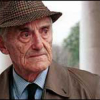Patrick O'Brian

Patrick O'Brian
Patrick O'Brian, CBE, born Richard Patrick Russ, was an English novelist and translator, best known for his Aubrey–Maturin series, a series of sea novels set in the Royal Navy during the Napoleonic Wars and centred on the friendship of English naval captain Jack Aubrey and the Irish–Catalan physician Stephen Maturin. The 20-novel series, the first of which is Master and Commander, is known for its well-researched and highly detailed portrayal of early 19th-century life, as well as its authentic and...
NationalityEnglish
ProfessionNovelist
Date of Birth12 December 1914